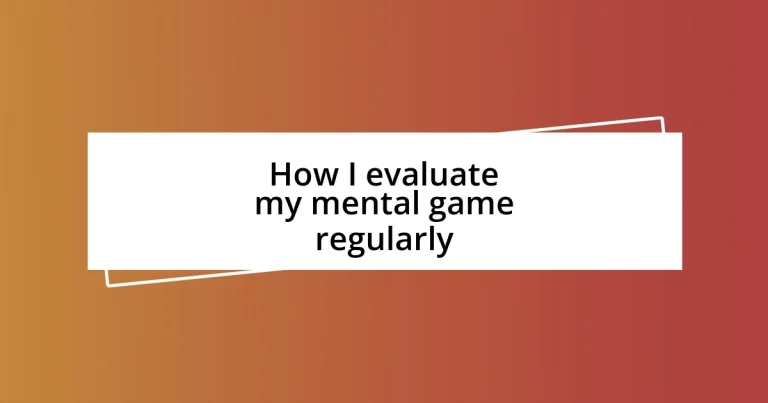Key takeaways:
- Regular mental game evaluations enhance self-awareness and promote proactive stress management, fostering personal growth and resilience.
- Utilizing tools like mood tracking apps, journaling, and mindfulness practices can significantly aid in self-assessment and identifying patterns in thoughts and emotions.
- Setting measurable goals and tracking progress over time helps maintain accountability and highlights improvements in emotional well-being, reinforcing motivation and mental strength.
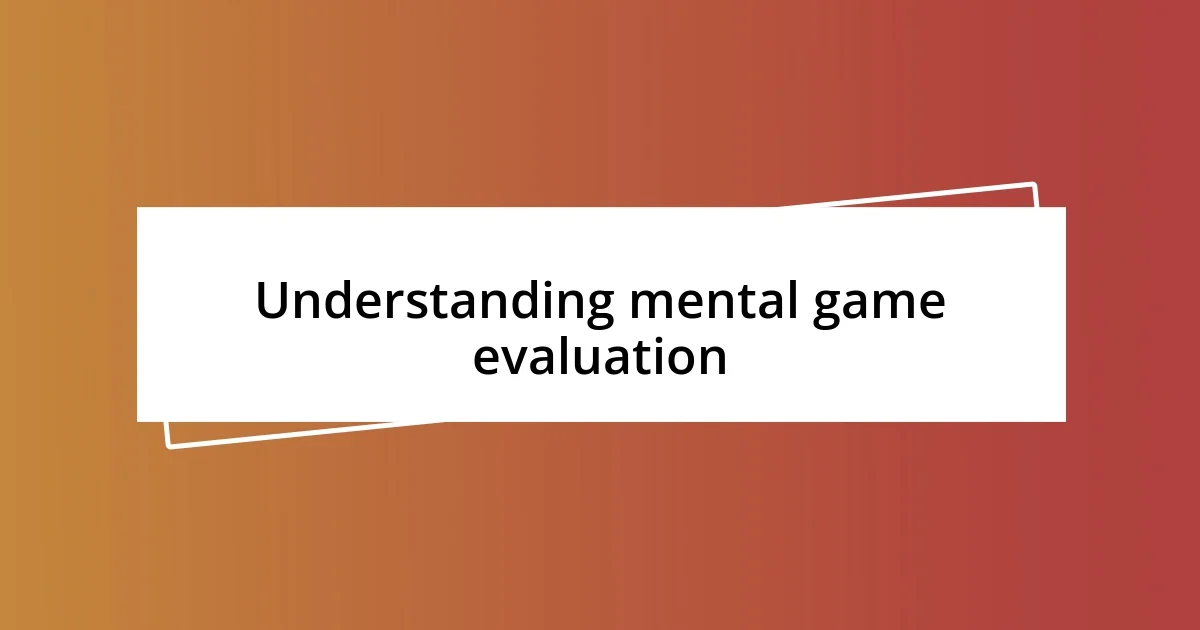
Understanding mental game evaluation
Understanding my mental game evaluation has become a pivotal routine in my life. I often ask myself, “Am I truly in the right mindset today?” This question opens up a process of introspection where I sift through my thoughts and emotions, revealing patterns that may have gone unnoticed.
Sometimes, I journal my thoughts after a long day, reflecting on what stirred my anxiety or excitement. For instance, I recall a time when I felt overwhelmed by a project deadline, and through writing, I realized that breaking down tasks into smaller, manageable steps eased my mental strain. It’s fascinating how those moments of clarity can transform worries into actionable plans.
On a deeper level, I actively assess stressors in my life and how they impact my mental resilience. For instance, I’ve learned that being proactive about my self-care—such as taking regular breaks or connecting with friends—enhances my mental clarity significantly. Reflecting on these aspects helps me maintain a balanced perspective, ensuring that my mental game is not only evaluated but continually improved.
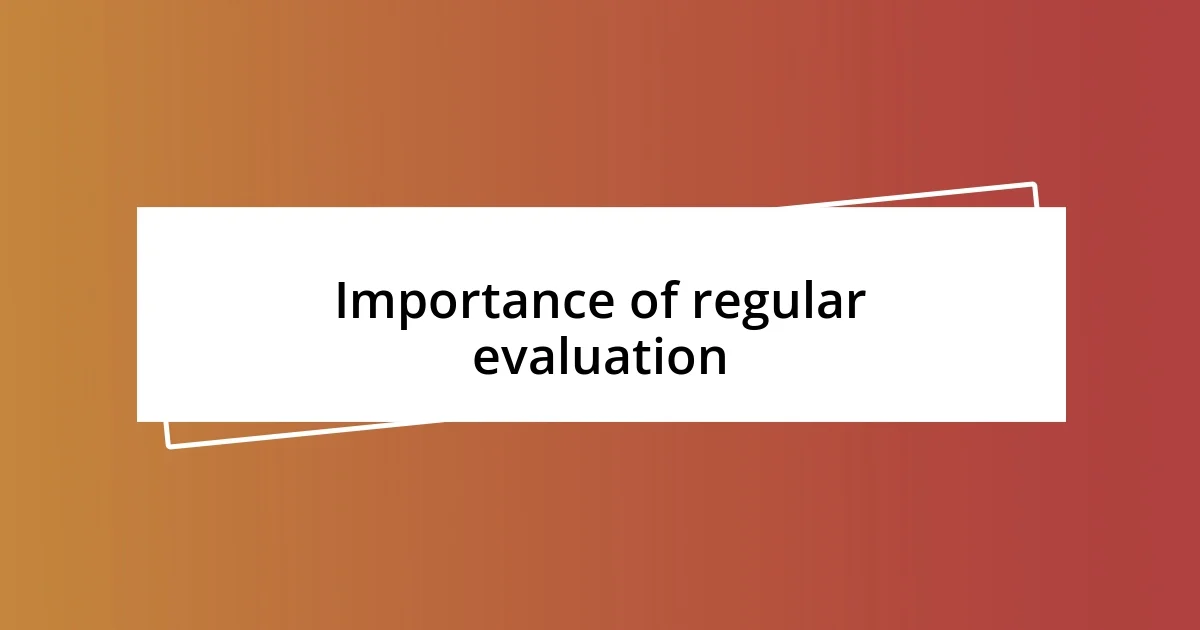
Importance of regular evaluation
Regular evaluation of my mental game plays a crucial role in my overall well-being. I often think about how easy it is to get caught up in daily routines without pausing to check in with myself. For example, I remember a particularly hectic week when I noticed a dip in my motivation. By taking a moment to assess my mental state, I discovered that burnout was creeping in. This realization helped me prioritize self-care, which ultimately rejuvenated my enthusiasm.
Engaging in frequent evaluations also creates a roadmap for my growth. Just recently, I found myself feeling less confident in social settings. After some reflection, I understood that addressing my underlying fears helped me strategically tackle similar situations in the future. Tracking these evaluations allows me to identify trends over time, empowering me to make necessary adjustments. This continuous loop of reflection and response has been invaluable.
Ultimately, the regularity of these evaluations fosters a proactive mindset, allowing me to catch potential pitfalls before they escalate. When I relate the concept of evaluation to skill-building, it’s like practicing an instrument; the more consistently I check in with my mental game, the more skills I acquire to manage my thoughts and emotions effectively. This commitment to self-assessment makes navigating life’s challenges feel less daunting.
| Benefits of Regular Evaluation | Consequences of Neglecting Evaluation |
|---|---|
| Increased self-awareness | Stagnant personal growth |
| Proactive stress management | Heightened anxiety and stress |
| Identifying patterns | Overwhelm and burnout |
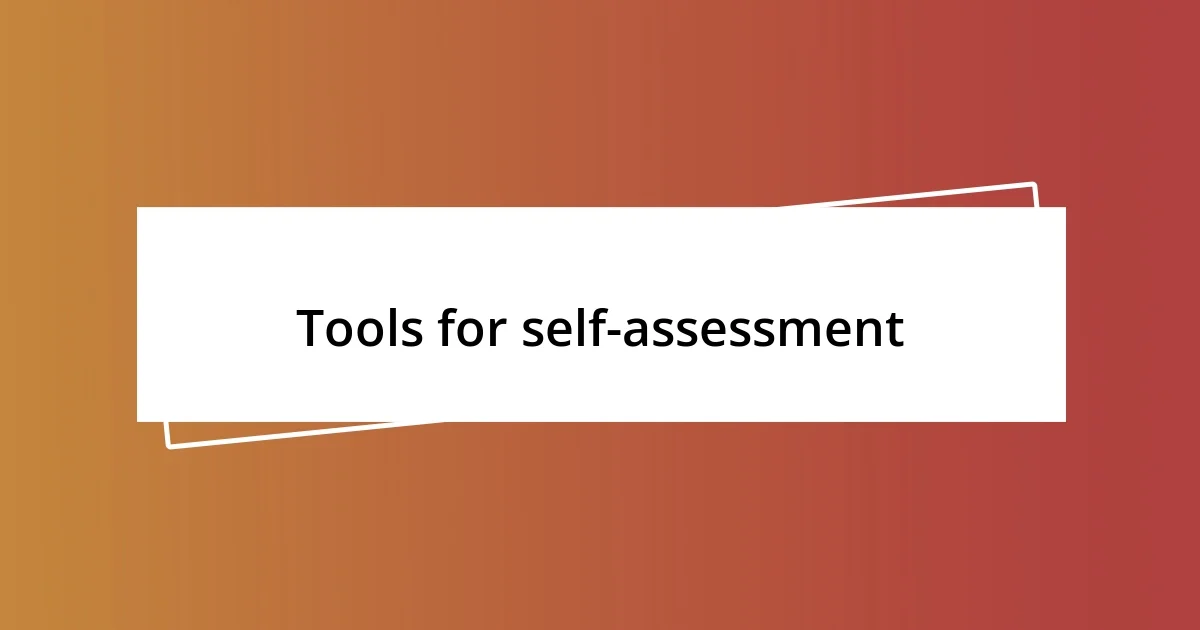
Tools for self-assessment
When I think about tools for self-assessment, a few methods truly stand out to me. One of my favorites is the mood tracker app I discovered last year. I used to dismiss my emotions as fleeting, but this app allows me to visualize my mood patterns over time. By logging my feelings daily, I can see connections I might have overlooked. For instance, I realized that my motivation levels dipped on days I skipped my morning routine. It’s surprising how much insight a simple tool can provide.
Here’s a list of effective tools for self-assessment that I find particularly useful:
- Mood Tracking Apps: Monitor and analyze mood changes over time, helping pinpoint triggers.
- Journaling: Write freely about thoughts and feelings, which can clarify complex emotions.
- Mindfulness Meditation: Spend a few minutes in silence to assess your state of mind and calm racing thoughts.
- Self-Reflection Questions: Regularly ask yourself key questions like “What am I grateful for today?” or “What challenges did I face?”
- Weekly Reviews: Dedicate time each week to reflect on experiences, assess emotions, and identify patterns.
I’ve noticed a real shift in how I view these tools. In the past, I approached self-assessment with skepticism, thinking it was just another task to add to my list. However, using these tools became less about judgment and more about understanding myself. For instance, during a particularly stressful month, I leaned heavily on journaling. By revisiting my entries, I recognized a recurring theme of feeling overwhelmed by social commitments. That realization prompted me to set healthier boundaries, alleviating unnecessary pressure. It’s incredible how self-assessment can lead to meaningful change.
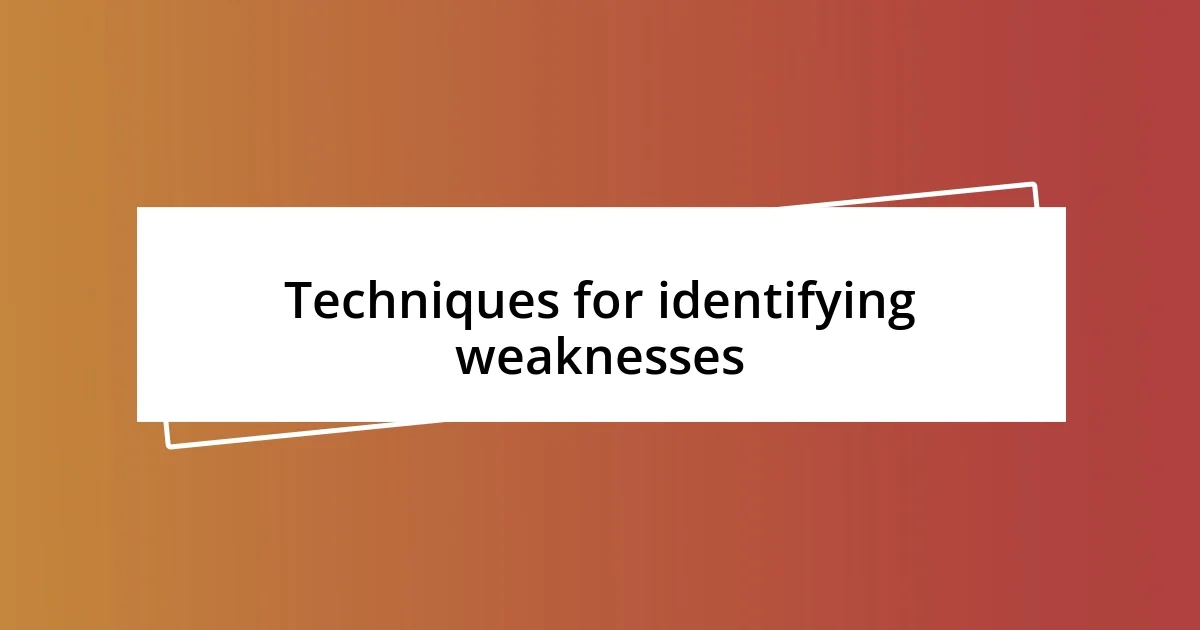
Techniques for identifying weaknesses
To identify weaknesses in my mental game, I often turn to self-reflection exercises. I remember a time when I felt constantly overwhelmed by my workload. Instead of pushing through, I decided to write down my stress triggers. By laying it all out on paper, I could see patterns emerge — certain tasks or situations consistently flared up my anxiety. This powerful visual representation helped me confront specific areas that needed attention.
Another technique I find invaluable is seeking feedback from trusted friends or mentors. On one occasion, I asked a close friend how I came across in group discussions. Their perspective helped me see moments where I was overly critical of myself, leading to missed opportunities for engagement. Engaging others in my mental evaluations not only sheds light on blind spots but also fosters a supportive dialogue that enhances my growth.
Lastly, I rely on performance reviews, not just in a professional sense but in daily situations. I often assess challenging moments after they pass. For example, after a tough presentation, I debrief with myself, noting what went well and what didn’t. Reflecting on my emotional responses in those instances allows me to pinpoint specific insecurities. Where did I hesitate? Why did my confidence waver? By dissecting these experiences, I gradually transform weaknesses into future strengths. Have you ever reconsidered a past experience and uncovered valuable insights? It’s fascinating how reflection can shift our understanding, isn’t it?
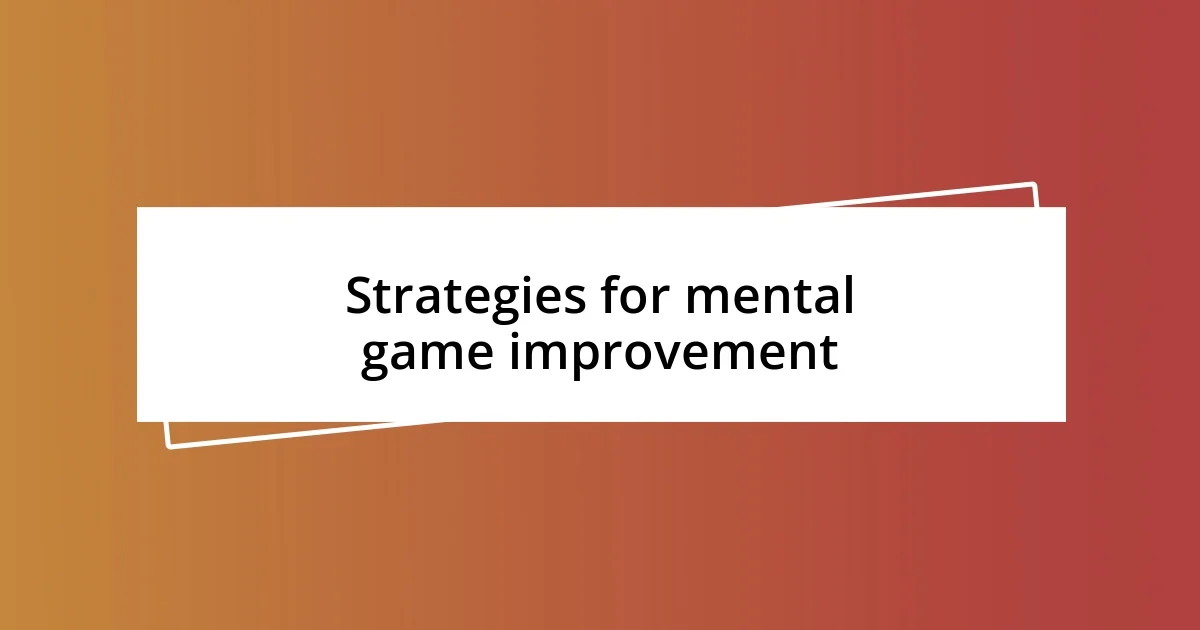
Strategies for mental game improvement
When it comes to strengthening my mental game, visualization techniques have been a game-changer for me. I remember preparing for an important meeting and feeling a wave of anxiety hit me. Instead of succumbing to that feeling, I closed my eyes and imagined the entire scenario unfolding perfectly. Visualizing not just the steps, but also how I would respond to potential challenges allowed me to approach the real situation with a newfound confidence. Isn’t it remarkable how a little mental rehearsal can pave the way for success in high-pressure moments?
Another strategy I find effective is establishing a daily affirmation practice. I used to overlook this as fluff, but I decided to give it a try one morning. I stood in front of the mirror and recited positive statements about my abilities and accomplishments. The impact was profound; it slowly shifted my mindset from self-doubt to self-encouragement. How often do we allow negative thoughts to linger unchallenged? Now, I’ve turned my affirmations into a daily ritual, making it a crucial part of my routine that reinforces my mental resilience.
Lastly, I can’t stress enough the importance of cultivating a strong support network. I’ve had moments when I felt utterly lost, but reaching out to friends and mentors ignited a spark of hope. One evening, I called a friend during a particularly tough week, feeling overwhelmed by expectations. Their insights not only offered me a different viewpoint but reminded me that I’m not alone in my struggles. Isn’t it comforting to know that we can lean on others for support? Surrounding myself with positive influences has transformed not just my mental game, but my overall well-being.
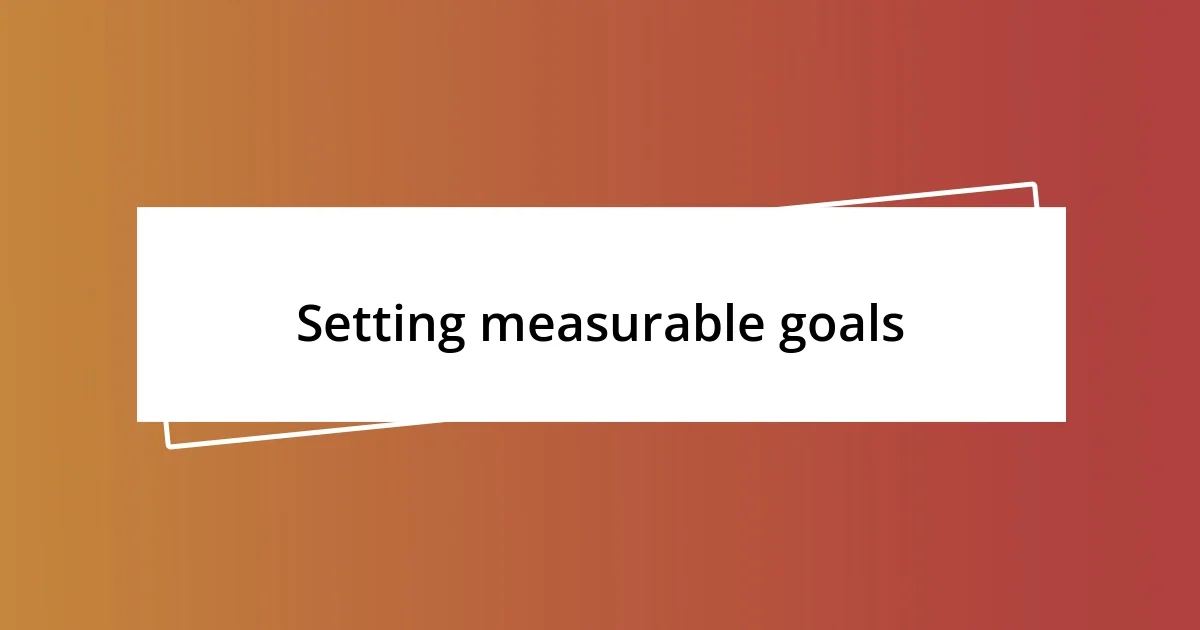
Setting measurable goals
Setting measurable goals for my mental game has been pivotal in tracking my progress. For instance, I vividly recall setting a specific goal to practice mindfulness for just ten minutes each day. Initially, it felt challenging, but establishing that quantifiable measure helped me stay accountable. Isn’t it surprising how simple metrics can lead to significant change?
As I worked towards these goals, I also began to reflect on my emotional state before and after each mindfulness session. I remember one day feeling particularly anxious; however, after my ten minutes of focused breathing, I noticed a remarkable shift. It was as if a weight lifted off my shoulders. By logging these experiences alongside my measurable goals, I could see not just improvement in my practice but also a clear link to my emotional well-being.
I often remind myself that setting goals isn’t just about the outcome, but also about the journey. For example, I recently aimed to reduce negative self-talk by keeping track of the times I caught myself in that cycle. It was eye-opening to realize how often I was critical of my performance. Each incident I recorded served as a reminder of my progress and encouraged me to replace negativity with affirmations. Have you ever paused to recognize your own patterns? It’s fascinating how awareness can empower change, isn’t it?
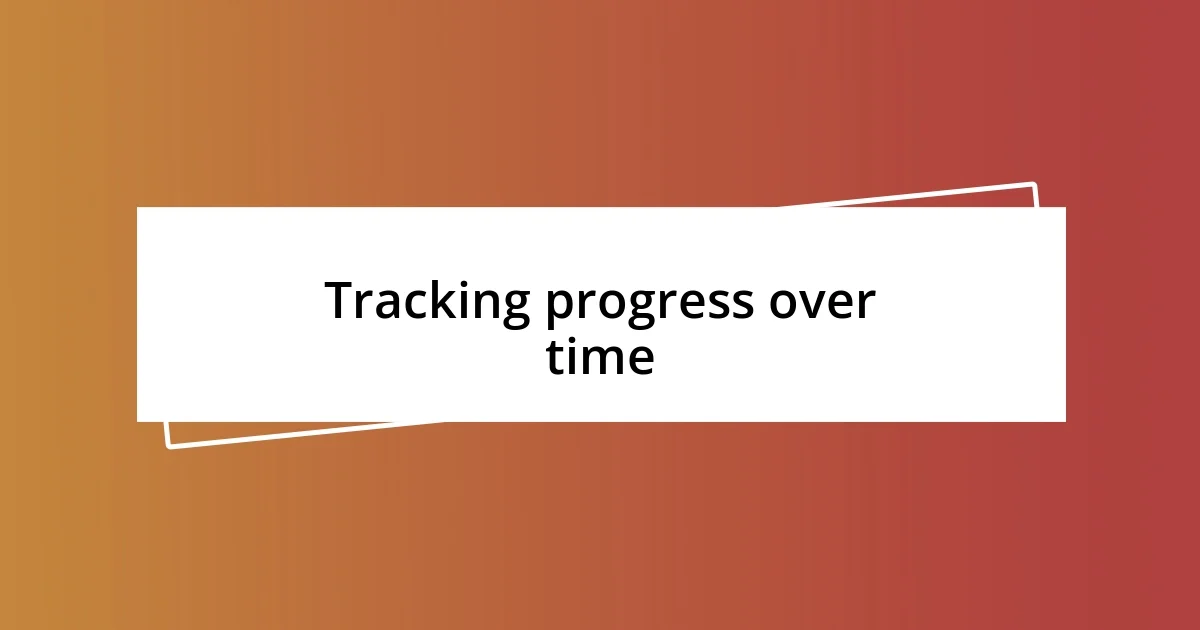
Tracking progress over time
Tracking my progress over time has been an enlightening journey. I vividly remember the day I started keeping a mental journal, jotting down my thoughts and feelings related to my mental game. It was astonishing to look back and see patterns emerge—certain triggers consistently led to moments of anxiety, while others lifted my spirits. Doesn’t it make you wonder how self-reflection can reveal so much about our own behaviors?
I also make it a point to evaluate how my emotional resilience evolves over weeks. One month, I faced a particularly tough challenge at work that left me feeling defeated. I revisited that journal and noticed an increase in my ability to cope with stress compared to my previous notes. Reflecting on that growth not only motivated me but also reinforced a sense of determination to keep pushing forward. Isn’t it empowering to feel progress in mental strength?
To take my tracking a step further, I now utilize apps that monitor my mood changes throughout the day. I remember the excitement I felt when I noticed a positive trend after actively practicing mindfulness techniques. Seeing that data visualized helped solidify my commitment. Have you ever tried using technology to support your mental well-being? It’s incredible how these tools can complement personal insights and pave the way for an even deeper understanding of our mental landscape.












